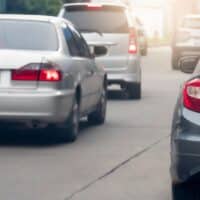How Tailgating Causes Car Accidents & How to Prevent Them

Tailgating, or following another vehicle too closely, is a dangerous driving behavior that poses significant risks to motorists on the crowded, busy streets of Philadelphia. Tailgating reduces the reaction time a driver has to make quick decisions and increases the likelihood of rear-end collisions. As a law firm that regularly represents victims of distracted driving and other car accidents caused by another driver’s negligence, Benedum Law is well familiar with the consequences of tailgating. Read on to learn how tailgating causes car accidents and how you can help avoid these dangerous crashes. If you or a loved one has been hurt in a crash with a negligent, reckless or aggressive driver in Philadelphia, call Benedum Law for a free consultation with an experienced and dedicated Chestnut Hill personal injury lawyer.
Causes of Tailgating Accidents
Reduced Reaction Time
When you’re tailgating, the distance between your car and the one in front of you is minimized. This reduced space limits your reaction time to respond to unexpected changes in traffic conditions. For instance, if the lead vehicle suddenly brakes, the tailgater might not have sufficient time to react, resulting in a collision.
Impaired Judgement
Tailgating often occurs out of impatience or aggressive driving behavior. This emotional state can further impair one’s judgment, making it challenging to assess risks correctly and make sound driving decisions.
Limited Visibility
Tailgating also affects one’s field of vision. When you’re too close to the vehicle in front, it becomes difficult to see beyond it, making you unaware of upcoming road signs, signals, or obstacles.
Legal Consequences in Philadelphia
Tailgating is not just risky; it’s also against the law. In Philadelphia, following a vehicle too closely is a traffic violation that can result in fines, points on your driving record, and increased insurance premiums. Moreover, if tailgating leads to an accident, you may be held liable for damages and could face a personal injury lawsuit.
Tailgating Accident Prevention Measures: Safe Driving in Philadelphia
Maintain a Safe Following Distance
Experts recommend keeping a minimum of a three-second distance between your car and the vehicle in front. This gap gives you ample time to react to sudden stops or changes in traffic patterns.
Use the “Three-Second Rule”
Identify a fixed point ahead like a signpost or building. When the car in front passes that point, start counting. If you pass the same point before reaching the count of three, you’re following too closely.
Be Cautious in Adverse Conditions
Rain, fog, and snow can compromise visibility and road grip. During such conditions, increase the following distance to allow for a longer reaction time.
Avoid Aggressive Drivers
If you encounter a tailgater, it’s advisable to switch lanes or pull over to let them pass. Engaging with aggressive drivers can escalate the situation and increase the risk of an accident. Be sure to signal your intentions when being tailgated; an aggressive tailgater might choose to zoom around you at any moment if they don’t know you are about to change lanes.
Prioritize Road Safety, and Call Benedum Law if You Get Hurt in a Crash That Wasn’t Your Fault
Tailgating is a hazardous driving practice that not only endangers your life but also puts other road users at risk. By understanding its dangers and adopting preventative measures, you can contribute to making Philadelphia roads safer for everyone.
If you or a loved one has been a victim of a tailgating-related accident or any other type of crash in Philadelphia, call Benedum Law in Chestnut Hill at 215-529-7848 (215-LAWSUIT) for a free consultation.